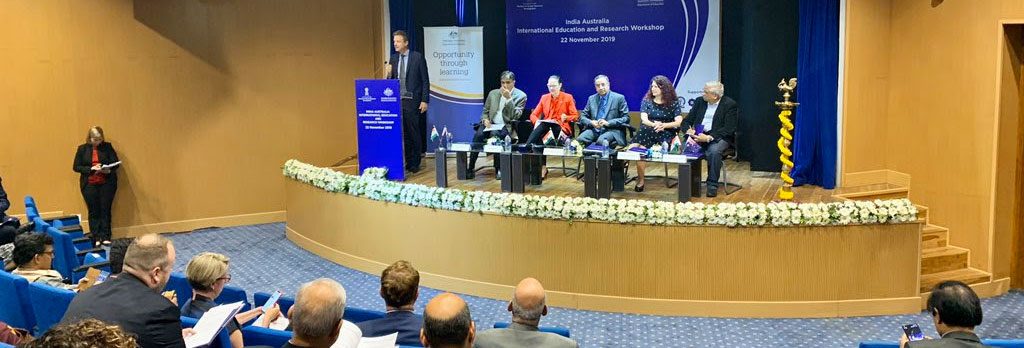India will be a growing source of international students and tertiary education opportunities for Australia, according to a new report Positioning for deeper engagement: a plan of action in India, released by the Council of International Education.
Minister for Education Dan Tehan welcomed the report, saying the Morrison Government was strengthening ties with India to grow Australia’s world-leading international education sector.
The number of Indian students studying in Australia has grown by 71 per cent since 2014, with 107,673 students enrolled to study last year.
The numbers quoted by the minister are somewhat misleading as the 2014 figure does represent the lowest of numbers after the violence against Indian international students became an issue in 2008-09. The official figure for enrollment of Indian international students in 2009 was 120,913. The figure of 107,673 used by the minister is way below the 2009 figure and thus does not reflect the true reality of the situation.
India has the fastest growing major economy in the world and was the second largest source country of international students for Australia.
And the official drive continues.

“Indian students contributed close to $5.5 billion to the Australian economy through higher education and the country represents a growing opportunity,” Mr Tehan said.
“Our two countries share strong cultural, sporting and historical ties and strengthening engagement through higher education will benefit both countries”, Mr Tehan added.
The Australia-India education partnership has been prioritised by the India Economic Strategy (2018), the Foreign Policy White Paper (2017) and the National Strategy for International Education 2025.
The Morrison Government has provided funding to the Australia India Institute to design and deliver a researcher hub in Delhi to support academics and students to engage with Indian colleagues.
Professor Jeffrey said he was pleased at the announcement of funding to Australia Indian Institute by the Morrison Government to design and deliver a researcher hub in Delhi to support academics and students to engage with Indian colleagues.
Taking a cue from the report, Minister for Education Dan Tehan visited India to strengthen the relationship with an important regional partner, creating new jobs and business opportunities in the education sector.
Australia India Institute Director and CEO Professor Craig Jeffrey delivered the welcome and introductory remarks at the India Australia International Education and Research Workshop 2019 in New Delhi.
Australia’s Department of Education and India’s Ministry of Human Resource Development were joint hosts of the India-Australia International Education and Research Workshop in Delhi.
The need for stringent Quality controls
While the head honchos of various think tanks and departments assigned the job of engaging Australia and India more and more, there are others who find a total lack of quality control when it comes to sourcing genuine students with the right level of educational skills required to join their chose future courses in Australia.
Bharat Times led the way back in 2003-04 conducting a seminar/workshop attended by experts including Dr Bob Birrell (of then Monash University) and community leaders where this issue of poor quality of international students coming from India was raised.
Strangely enough, rather than putting in place stringent quality controls, governments both state and federal introduced a total deregulation of education and transformed education into an industry where investors would seek good returns no matter what. The ensuing 5-6 years saw private RTOs sprouting up everywhere and an influx of international students from China and India (and many other countries) with very little quality control in place.
It is needless to say bureaucrats while designing the new policy completely stuffed up the control mechanism and introduced ill-conceived financial processes which some private RTOs took full advantage of. As a consequence, the legit providers including the reputed universities ended up cash strapped and were left with very little option but to do what their (infamous) private competitors, the street corner located private RTOs were doing.
As was earlier highlighted by the ABC’s Four Corners program, there is a clear need for quality control of incoming students, as robust as the strength of the drive to do education business with India. A case in point is that of Murdoch University highlighted by the program which was in $5 million deficit before it started targeting international students. They soon found themselves to be having $15 million surplus.
But not without the consequences of such a drive:

“Many students seemed to be unable to understand instructions or understand the material that was put in front of them, and there were, also, cases of students who apparently didn’t understand how to use a computer in any sophisticated way, so even logging on was a struggle for some students. There were also stories about students not recognizing what a USB stick was and other incidents which you would not expect to see from students who have an IT degree”, DR Duncan Farrow told the ABC.
As Assoc Prof Gerd Shroder-Turk told the ABC “education is a very sensitive product”, the policy frame work around it and the people engaged in designing it, must not forget that they are dealing with ‘education’ not an industry or business which must generate profitability.
“And we need to be very careful in that space to make sure that we do it in an ethical and moral way and in one that’s best for everyone”, Assoc Prof Gerd Shroder-Turk concluded.
Read the full report, Positioning for deeper engagement: a plan of action in India, here.
Similar Posts by The Author:
- BAPS temple vandalism critic Canadian MP Chandra Arya on Pannu’s radar
- Dutton asks Albanese to sack Andrew Giles
- Victorian Liberals and Nationals demand Royal Commission into CFMEU misconduct under Labor
- Peter Khalil welcomes more funding for emergency accommodation and support for women and children in Wills
- Dogged Vic government powering ahead with the Suburban Rail Loop

